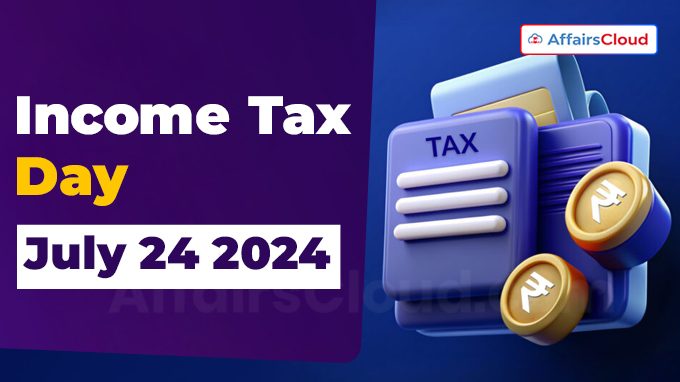 Income Tax Day or Aaykar Diwas is annually observed across India on 24th July to commemorates the introduction of Income Tax (IT) in India in 1860.
Income Tax Day or Aaykar Diwas is annually observed across India on 24th July to commemorates the introduction of Income Tax (IT) in India in 1860.
- Aim: To raise awareness about the importance of paying taxes and their role in national development.
- The IT Day serves as a reminder of citizens’ duty to contribute to the nation’s progress through timely and honest tax payments.
24 July 2024 marks the 165th anniversary of IT Day.
History of Income Tax Day:
i.The IT (Budget) system in India was introduced by Sir James Wilson, a Scottish businessman, and the first Finance Member of the Council of British India.
ii.This initiative was introduced to compensate for the loss during British rule’s first war of Independence (1857).
iii.This initial implementation laid the foundation for the Comprehensive Income-tax Act of 1922, establishing a structured tax system in India.
- This Act not only formalised various IT authorities but also laid the groundwork for a systematic administration framework.
iv.The Income Tax Act 1961 is a comprehensive framework enacted by the Indian Parliament framing the regulations governing the IT system in India.
v.In 2010, the Government of India (GoI) officially designated 24 July as Income Tax Day to honour the 150th anniversary of the introduction of the IT system in India.
What is Income Tax (IT)?
i.The IT is a government levy on the income earned by individuals and businesses during a financial year.
ii.“Income” encompasses various sources, defined broadly under Section 2(24) of the IT Act 1961.
- They are: Income from Salary, Income from House Property, Income from Business or Profession, Income from Capital Gains and Income from Other Sources.
The Growth of Personal Income Tax in India:
The landscape of Personal Income Tax (PIT) in India has seen significant growth, reflecting India’s expanding economy and improved tax compliance.
i.2020-21: Gross personal income tax, including the Securities Transaction Tax (STT), stood at Rs 5.75 lakh crore. This marked a substantial contribution to national revenue despite the COVID-19 pandemic.
ii.2021-22: Gross PIT collections rose to Rs 7.10 lakh crore, attributed to economic recovery and enhanced tax collection mechanisms.
iii.2022-23: Collections reached Rs 9.67 lakh crore, demonstrating the effectiveness of tax reforms and a buoyant economy.
iv.2023-24: As of April 21, 2024, collections surged to Rs 12.01 lakh crore (provisional).
- This increase underscores the robustness of the Indian economy, improved taxpayer compliance, and government efforts to broaden the tax base.
Key Changes in Income Tax Slabs- Budget 2024-25:
i.The standard deduction for salaried employees has been raised from Rs 50,000 to Rs 75,000 for those opting for the new tax regime.
ii.For pensioners, the deduction on family pension has increased from Rs 15,000 to Rs 25,000.
iii.Assessments can now be reopened beyond 3 years, up to 5 years if the escaped income exceeds Rs 50 lakh.
iv.The revised tax regime offers substantial benefits, potentially saving salaried employees up to Rs 17,500 in income tax.
Notable Initiatives:
The Central Government has undertaken several steps to boost tax collection and expand the tax base. Some of them are:
1.Simplification of PIT:
i.Finance Act, 2020 offers lower slab rates if exemptions and incentives are not claimed.
ii.Finance Act, 2023 sets new default rates under section 115BAC(1A) for assessment year 2024-25.
2.New Form 26AS: It contains comprehensive tax information and Specified Financial Transactions (SFT), payment of taxes, etc., encouraging disclosure of true income.
3.Pre-filling of Income Tax Returns (ITR): It provides pre-filled ITR with salary, bank interest, and dividend details for easier compliance.
4.Income Tax Returns (ITR):
i.It is a form that individuals are required to submit to the IT Department of India, reflecting income and tax details for a financial year (starting on 1st April and ending on 31st March of the following year).
ii.The number of persons who filed ITR in the last 4 years (2019-2023):
- 2019-20: 6.48 crore
- 2020-21: 6.72 crore
- 2021-22: 6.94 crore
- 2022-23: 7.40 crore
About the Central Board of Direct Taxes (CBDT):
The CBDT is the apex policy-making body for the IT department and is a part of the Department of Revenue in the Ministry of Finance (MoF). It came into effect in 1964, functioning under the Central Board of Revenue Act of 1963.
Chairman– Ravi Agrawal
Headquarters– New Delhi, Delhi




